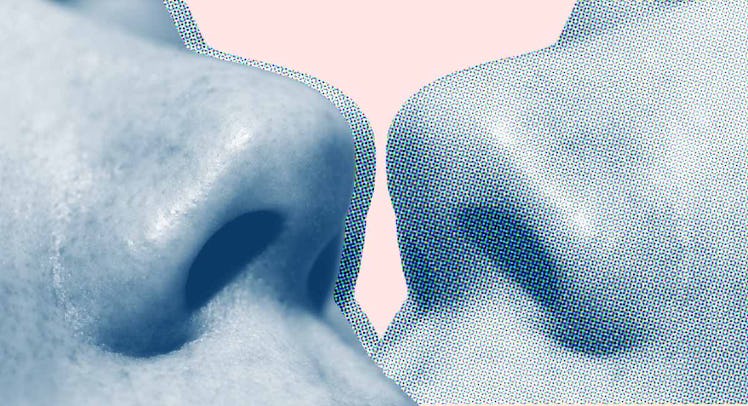Babies Are Smelly, But That Doesn’t Mean They Have Pheromones
What you thought were pheromones attracting you to your partner or bonding you to your baby may just be smells.

Despite what you’ve heard and smelled, humans probably don’t produce pheromones. For the uninitiated, pheromones are chemicals produced by one animal that provoke a social response in a member of the same species through smell. Humans like to brag that their natural scents work the same way — that our pheromones facilitate sexual selection and help get us laid. But scientists suspect you’re less likely to be smelling pheromones and more likely to be smelling a bit of bullshit.
“There’s as much evidence that humans don’t have pheromones than evidence that they do,” Tristam Wyatt, zoologist at Oxford University and author of the book Pheromones And Animal Behavior. Wyatt, who also published a literature review on the topic, spoke to Fatherly about the possibility that humans evolved their way out of pheromones, and why the smells that attract you to your mate and help you bond with your baby may not be pheromones at all. (They’re probably just smells).
Can you explain the difference between pheromones and other smells?
There was a study done in Switzerland, “the t-shirt experiment”. What it seemed to show was that women, like mice, gravitated to smells that indicated difference, and this was good in evolutionary returns. The twist on the story was that if women were on birth control pills, women gravitated to smells more similar to their own. It made a really nice story, but it’s not about pheromones because the way you find pheromones is looking for molecules that are the same in every male and every female. Or looking for molecules every mother produces and every baby responds to. In the t-shirt experiment, it’s all about individual smells. And when the t-shirt experiment works, it’s about individual compatibility, not pheromones.
So all pheromones are smells, but that doesn’t mean all smells are pheromones?
That’s correct. They’re a special kind of smell with a signal function.
What went wrong with pheromone research to make people think that we have them?
I think what’s happened with these human pheromones, or claimed human pheromones, was that the molecule actually had no effect. Psychologists tested them and only published something when they found something, but didn’t publish when they didn’t. You’re actually looking at a biased set of papers. This is called the desk drawer effect.
Is there an evidence-based way to test for human pheromones?
To study a pheromone, first you have to have the behavioral physiology or physiological effects to test them against that can be observed. Then you need some sort of biological effect that can be observed that is reliably related to smell. You need that for your bioassay because when you start to look for molecules you need to come back to that to see if they match up.
That sounds complicated. Where could we start?
Breastfeeding might be promising. The nice thing with breastfeeding is that there seems to be a secretion produced by mothers around the nipple, which appears to cause any baby, not just with its own mother, to open its mouth and start sucking. That gives you a nice bioassay. A team in France is just starting work with chemists to isolate the molecules in the secretion, then going back to the babies to say, here’s the real secretion, and here are the molecules from the secretion we’ve isolated. Are these enough to get the babies to start sucking? That way they can narrow down what the molecules are and then finally take synthetic molecules and see if they cause the same biological response and the initial one observed.
That seems promising.
What’s really exciting to me is that this could be the first human pheromone to be chemically identified. And that gives more confidence to look for other pheromones. It may turn out that the work doesn’t replicate, and it may turn out as far as sex pheromones are concerned, that humans don’t have them. That’s a distinct possibility. There are so many other ways we might choose our mates and so much has changed in the last 200,000 years. It could turn out that humans, unlike other mammals, no longer have pheromones.
Is it possible babies respond to pheromones and adults don’t?
Yes. It would be perfectly possible to evolve to where adults are no longer paying attention or responding to pheromones, but babies were. Even if we find a pheromone in babies that won’t prove that adults have them. It would just give us more confidence to study them in adults.
In theory, why would humans have evolved to not rely on pheromones?
One thing could be as simple as paying more attention to visual cues and downgrading smells. Even with the origination of language — perhaps courtship is about having better jokes to tell. Who knows? More recent research shows that humans actually have a very good sense of smell. It’s possible that our response to pheromones, if we had them in the past, is gone. But it’s not because smell is no longer important.
If there were no human pheromones, what would that mean for parents bonding with their infants?
Smell is almost certainly important in bonding, but bonding is multi-sensory. Babies are learning the voices of their parents, but also their smells, and their parents and siblings are learning the smells of babies. The fact that we haven’t discovered human pheromones yet doesn’t mean smells aren’t important. Smell is very important, for bonding and everything else, but those are individual smells, not pheromones. Humans are smelly and that’s a good thing.
This article was originally published on